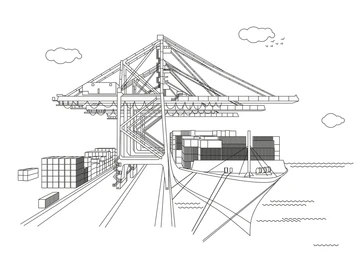Financing is often the most crucial aspect of real estate development, as securing the right kind of capital can make or break a project. Whether you’re a seasoned developer or just starting out, understanding the different financing options available and how to manage budgets throughout the life of a project is essential for success. This blog will serve as a comprehensive guide to financing real estate development projects, including the types of financing available, how to secure funding, and best practices for managing the project’s budget from start to finish.
1. Introduction to Real Estate Development Financing
Real estate development financing is the process of securing funds for the various phases of a development project, including acquisition, design, construction, and final delivery. This section will outline the importance of financing in development and give an overview of the different financing stages of a real estate project.
- What Is Real Estate Development Financing?: An overview of financing in the development process.
- Why Financing is Critical for Success: How financing impacts every stage of development, from land acquisition to project completion.
- The Financing Lifecycle: Understanding the phases of a development project and when funding is required.
2. Types of Real Estate Development Financing
Understanding the various financing options available is critical for securing the right type of funding for your project. In this section, we will explore the different types of financing used in real estate development, from traditional bank loans to newer methods like crowdfunding and private equity.
- Traditional Bank Financing: Conventional loans from banks, their advantages and requirements.
- Private Equity and Venture Capital: How private investors and venture capitalists provide funding, and the pros and cons of using them.
- Crowdfunding for Real Estate: The rise of crowdfunding in real estate development and how to leverage it for your project.
- Construction Loans: Short-term loans specifically for funding the construction phase of a project.
- Mezzanine Financing: How mezzanine debt can provide additional capital in exchange for equity or higher interest rates.
- Government Grants and Incentives: Government-backed financing options and tax incentives for developers.
3. How to Secure Financing for Your Real Estate Development
Securing financing for a development project requires a combination of research, preparation, and strong relationships with investors or lenders. This section will provide practical tips and strategies for successfully securing the right financing for your project.
- Creating a Business Plan: Why a detailed business plan is essential for obtaining financing.
- Building Relationships with Lenders & Investors: How to develop strong relationships with lenders, banks, and private investors.
- Preparing a Compelling Pitch: How to craft a presentation that highlights your project’s potential and your qualifications as a developer.
- Financial Documents You Need: Key documents lenders or investors will want to see, including pro formas, cash flow projections, and balance sheets.
- Understanding Loan Terms: How to negotiate favorable loan terms, including interest rates, repayment schedules, and collateral.
4. Budgeting for Real Estate Development
A clear, well-structured budget is critical to the success of any development project. In this section, we’ll explore how to create and manage a development budget to ensure that the project remains financially viable throughout its lifecycle.
- Components of a Real Estate Development Budget: Breaking down the major cost categories, such as land acquisition, construction, permits, and marketing.
- Cost Estimation: How to estimate costs accurately during the planning phase to avoid overruns.
- Tracking Expenses: Implementing systems to track and manage expenses as the project progresses.
- Contingency Planning: Setting aside funds for unexpected costs, delays, or scope changes.
5. Managing Cash Flow During the Project
Effective cash flow management is essential to keep a project moving smoothly without unnecessary financial strain. This section will focus on managing cash flow throughout the project, from acquiring financing to ensuring timely payments to contractors.
- Cash Flow Projections: How to forecast cash flow and understand when funds will be required throughout the project.
- Handling Delays in Payments: How to manage cash flow when unexpected delays affect the project timeline or payment schedule.
- Maintaining Positive Cash Flow: Techniques for keeping cash flow positive during challenging phases of the project.
- Managing Subcontractor Payments: How to structure payment schedules to keep subcontractors motivated while protecting your project’s financial stability.
6. Risk Management in Real Estate Development Financing
Managing risk is crucial in any development project, and financing is no exception. In this section, we’ll explore how to mitigate financial risks during the development process and avoid common pitfalls.
- Identifying Financial Risks: How to recognize the financial risks in development, including market shifts, cost overruns, and financing issues.
- Insurance & Bonds: The types of insurance and bonds developers should have to protect themselves financially.
- Market Risk: How to protect your project from fluctuations in the market, including interest rates and property value changes.
- Legal and Regulatory Risks: Navigating legal challenges and complying with local laws and building codes.
7. Maximizing Returns on Investment
Real estate developers aim to maximize their returns on investment (ROI), whether they’re selling the property or renting it out. This section will focus on strategies to increase ROI by managing costs effectively, making smart design choices, and optimizing the marketability of the property.
- Increasing Property Value: How to boost the value of your property through smart design, location selection, and sustainability.
- Cost Reduction Strategies: How to reduce construction and operational costs while maintaining quality.
- Leveraging Tax Incentives: Understanding and utilizing available tax incentives and subsidies for development projects.
- Financing for Long-Term ROI: How to choose financing strategies that will maximize returns over the long term, including refinancing options.
8. Managing Post-Development Finances
After the construction phase is complete, managing the finances of the project doesn’t end. This section will cover the post-development phase, including final cost analysis, financing strategies for selling or leasing, and financial planning for property management.
- Post-Construction Cost Analysis: Reviewing and analyzing the actual cost vs. budgeted cost.
- Selling or Leasing the Property: Strategies for marketing the property to potential buyers or tenants.
- Managing Operational Costs: How to manage ongoing costs for property management, maintenance, and rent collection.
- Refinancing Options: Exploring refinancing as a strategy to unlock capital or reduce debt.
9. Lessons Learned and Best Practices in Real Estate Financing
The real estate development process can be complex and filled with challenges. This section will share key lessons learned from successful developers and best practices to follow to avoid common mistakes.
- Real Estate Financing Mistakes to Avoid: Common pitfalls that developers encounter and how to avoid them.
- Best Practices for Financial Planning: Tips and strategies for ensuring that your finances remain healthy throughout the project.
- Leveraging Professional Expertise: The importance of hiring financial advisors, accountants, and consultants to guide you through the financing process.
- Learning from Failure: How to learn from past mistakes and improve your financial strategies in future projects.
10. Conclusion: Navigating the Path to Successful Real Estate Development
Securing financing is one of the most critical components of a successful real estate development project. By understanding the types of financing available, mastering budget management, and mitigating risks, developers can increase the likelihood of their project’s success. This section will recap the key takeaways from the guide and offer advice on how to continue growing in the field of real estate development.
- Building Long-Term Relationships: Developing strong relationships with financial partners and investors.
- Continuing Education: How to stay informed about new financing trends and tools.
- Strategies for Future Success: Ensuring that each project is a stepping stone toward greater development opportunities.
























Join The Discussion